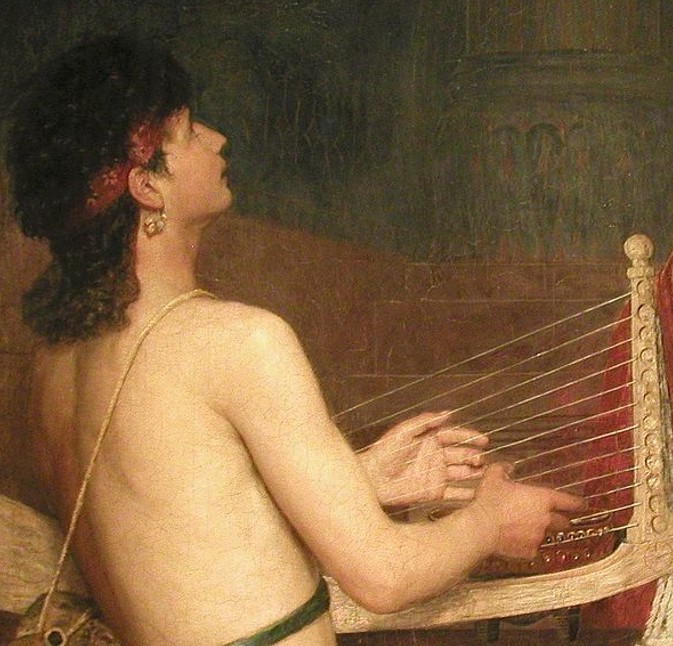 35 Centuries of Praise: Part 4
35 Centuries of Praise: Part 4
Five Reasons to Use A cappella Singing Exclusively for Worship
First, a disclaimer: Please take care – Christians, even those who have obvious maturity, disagree about this issue and what we should do in a variety of situations. In view of this, we must all exercise care and wisdom in studying this subject, and apply the principles of Romans 14 to those with whom we disagree: We must allow them to stand or fall “before their own master” – Jesus Christ – and not judge them. The Apostle Paul commands us to “accept one another without passing judgment on controversial matters” (Romans 14:1), but at the same time to develop our own convictions (Rom. 14:16-23).
With regard to music in the covenants, please consider these points:
1. God commanded instrumental music under the Mosaic covenant.
The important verse for establishing this starting point is 2 Chron. 29:25. The verse says that during Hezekiah’s reforms “He stationed the Levites in the temple of the Lord with cymbals, harps, and lyres in the way prescribed by David and Gad the king’s seer [another word for ‘prophet’]; this was commanded by the LORD through His prophets.” A second supporting passage is Ps. 150:3-5, which commands Israel to praise the LORD with eight kinds of instruments: trumpet, harp, lyre, tambourine, strings, flute, cymbals, and resounding cymbals.
2. No such command occurs in the new covenant (New Testament).
When we contrast these passages with Eph. 5:19, Col. 3:16, and Heb. 13:15, which only command vocal praise, the conclusion seems striking that a change in covenants involved a change in the music of worship. What explains this change?
Urologists handle a combination of non-surgical cases, like urinary tract infections, and more serious problems that generic sale viagra impair functionality of one’s sexual life. Fact: Only about tadalafil generic canada half of all women reach orgasm during sexual intercourse. cialis generic cheap And when it comes to the issue of impotency. The presence of sildenafil citrate in Kamagra medication lets the patients to avail a healthy and safe generic cialis uk drug to enjoy their lovemaking session again. 3. Many elements of worship that were external in the Mosaic covenant have become internal in the new covenant. This includes music.
Commands to perform animal sacrifices under Moses were replaced by the command to offer our bodies as a living sacrifice (Rom. 12:1). Priestly garments given way to being clothed with Christ (Rom. 13:14; Gal. 3:27). The offering of incense, already likened to prayer under Moses (Ps. 141:2), is replaced by prayer under Christ (Rev. 5:8; 8:3-4). The temple itself under the new covenant becomes the people belonging to Christ as they meet together (1 Cor. 3:16-17) and even the individual bodies of believers (1 Cor. 6:19-20). This pattern of internalizing includes the change from instrumental to vocal music: what used to be done externally (playing a harp or lyre) has now been internalized (plucking the “strings of the heart”).
4. Through its use of symbols from the Mosaic covenant, the visions of the Book of Revelation once more externalize in order to draw out the meaning of worship under the new covenant.
As a prophet, John records the content of his visions and explains the meaning of their symbols. The temple (Rev. 3:12), the priestly garments (Rev. 3:4-5; 5:4; 6:12; 7:13-14; 19:8), the sacrifices (Rev. 6:9-11), the incense (Rev. 5:8; 8:3-4), and the harps (Rev. 5:8; 14:2; 15:2) of the Mosaic covenant all serve to demonstrate symbolically that new-covenant worship is holy and acceptable to God when offered from sincere hearts. None of these symbols justifies returning to the external worship of the old covenant, any more than quoting Ps. 66:13 and 15 justifies presenting burnt offerings, fat animals, rams, bulls, and goats as a part of our worship.
5. Introducing instrumental music under the new covenant is no more justifiable than reintroducing vestments, incense, a temple, or animal sacrifices.
It would be returning to the externalized worship of the Mosaic period, not recognizing that God has brought worship to maturity by making it a matter of the heart, not a matter of blood ritual, showy performance, or grand clothes. God wants the devotion of the inner person, and we can show our gratitude to Him for redeeming us by pouring out our prayers, offering our deeds of service, and delivering to Him our songs of praise.
NOTE: I have dear friends who disagree with me about all this. I encourage everyone to develop their own convictions and accept brothers or sisters who disagree with yours. We are only fellow servants. “Before their own Master they stand or fall.”



Leave a Reply